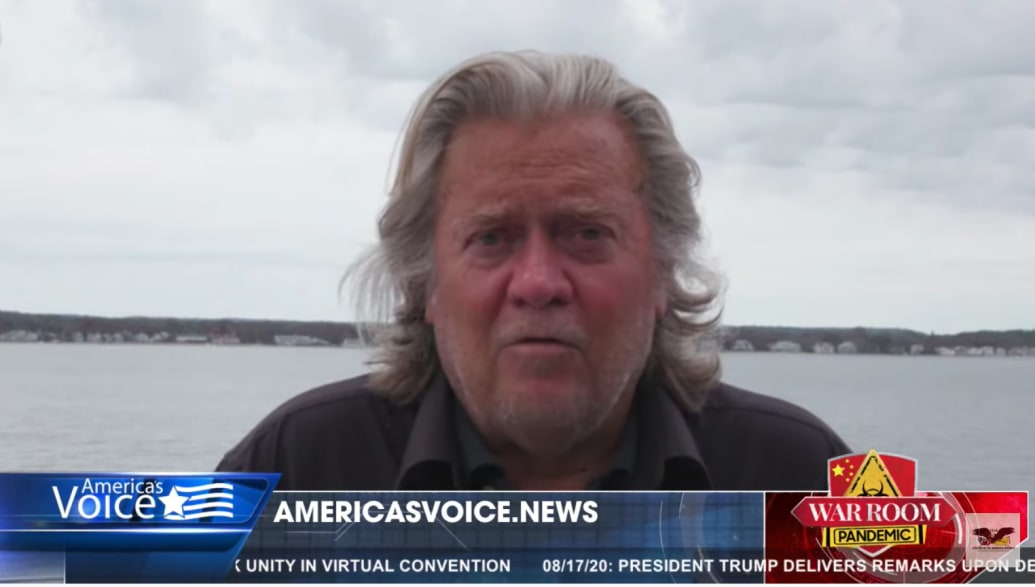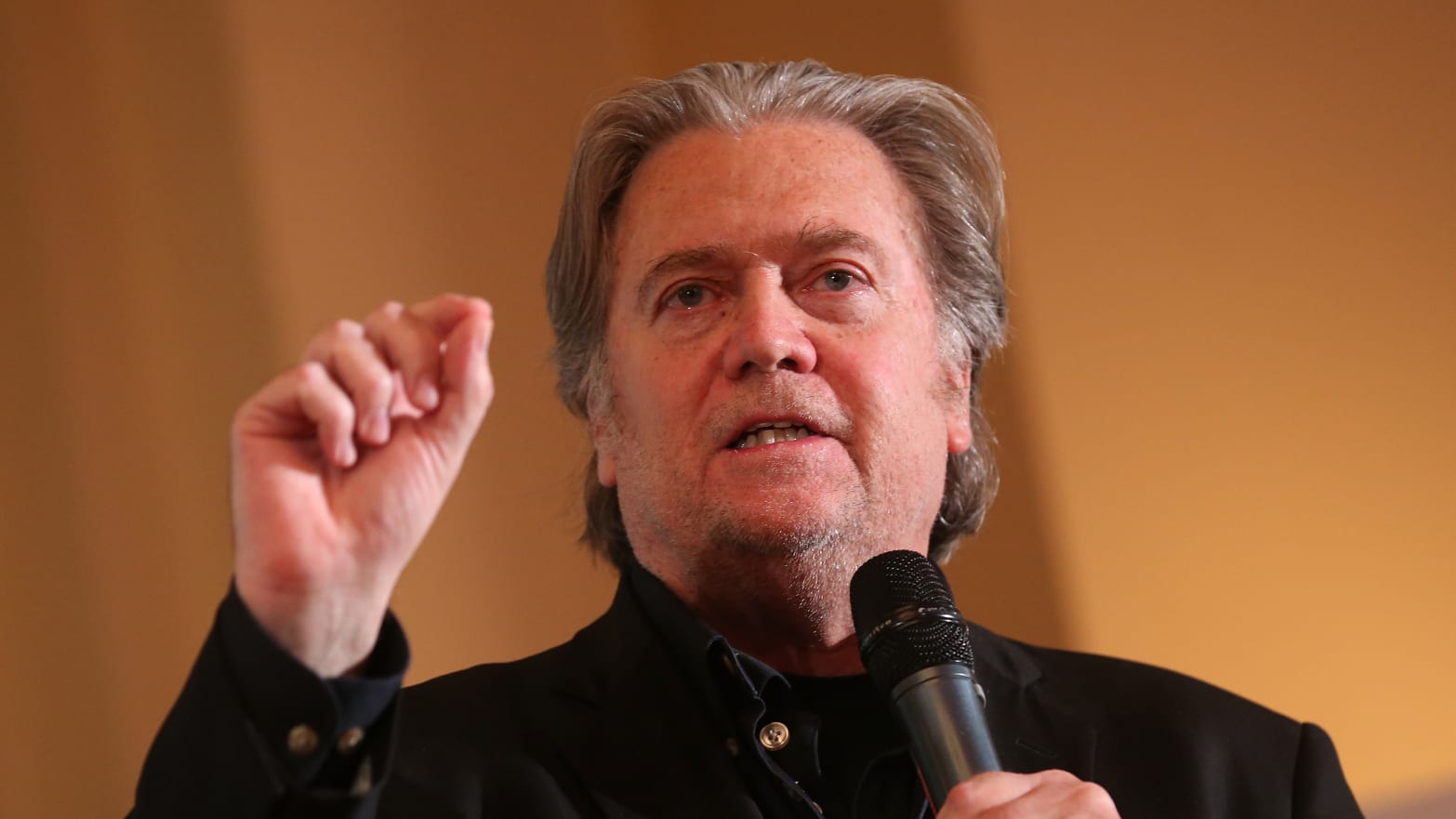Steve Bannon, former chief strategist to President Donald Trump, was arrested in New York Thursday on charges of using the viral “We Build the Wall” fundraising campaign to enrich himself.
Hundreds of thousands of donors who gave a total of $25 million to the crowdsourced campaign were defrauded by Bannon and three associates, federal prosecutors in Manhattan said.
Some of the money instead funded luxury cars, home renovations, cosmetic surgery, and a 2019 Jupiter Marine boat named Warfighter.
Three others were indicted along with Bannon on Thursday: campaign founder and triple-amputee Air Force veteran Brian Kolfage, colorful businessman Andrew Badolato, and Timothy Shea.
“As alleged, the defendants defrauded hundreds of thousands of donors, capitalizing on their interest in funding a border wall to raise millions of dollars, under the false pretense that all of that money would be spent on construction,” Audrey Strauss, acting U.S. Attorney for the Southern District of New York, said in a statement.
Bannon, 66, is the latest Trump-world figure to be targeted by prosecutors in the Southern District of New York, coming after the 2018 arrest and prosecution of Trump’s fixer Michael Cohen and probes into Trump’s personal lawyer Rudy Giuliani. He is the seventh Trump associate to be criminally charged during the Trump administration.
During his first court appearance on Thursday, Bannon, through his counsel, pleaded not guilty to both counts of the indictment and his bail was set at $5 million, secured by $1.75 million in cash or property. U.S. Magistrate Judge Stewart Aaron ruled that Bannon will not be allowed to travel internationally, or outside a limited number of agreed-upon states. He’ll also be under pre-trial supervision. Bannon is set to await trial in the D.C. area but will be allowed to travel to Connecticut for business. His next court appearance was scheduled for Aug. 31.
He was arrested at 7:15 a.m. off the coast of Connecticut on Thursday morning aboard the mega-yacht Lady May, owned by business pal and fugitive Chinese billionaire Guo Wengui. Just the day before, Bannon appeared to host a podcast episode from the yacht and even interviewed Kolfage to promote the fundraiser.

Steve Bannon appeared to host a podcast episode from the mega-yacht.
YouTube/War Room Pandemic
Kolfage, who received a Purple Heart after he was injured in Iraq in 2004, started the We Build the Wall campaign in late 2018 to raise money to privately build Trump’s much-hyped wall on the U.S.-Mexico border. He promised donors that he wouldn’t be paid a cent, insisting in a Washington Post interview that he was merely fed up with “political games from both parties.”
The campaign exploded in popularity, raising $17 million in its first week. But as questions were asked about how the money would be managed, GoFundMe dropped the campaign and Bannon was brought on.
Within days, Bannon and Badolato, a business associate with an insanely checkered past, had taken on the day-to-day running. They set up a non-profit organization called We Build the Wall Inc. and stacked its board with MAGA-world luminaries, including former Kansas Secretary of State Kris Kobach, former Milwaukee sheriff David Clarke, and former baseball pitcher Curt Schilling. Blackwater founder Erik Prince, the brother of Trump Education secretary Betsy DeVos, was also on the board.
The campaign earned praise from Donald Trump Jr., who sold signed copies of his book to raise money for the campaign.
“This is private enterprise at its finest. Doing it better, faster, cheaper than anything else. What you guys are doing is amazing,” Trump Jr. said in a testimonial on the project’s website, which was still live on Thursday. (Rep. Louie Gohmert (R-TX) and and Corey Lewandowski also gave testimonials.)
In a Jan. 2019 interview with The New York Times, Kobach said he’d told the president about the project and Trump had replied, “The project has my blessing, and you can tell the media that.”
But on Thursday, Trump distanced himself from the project. “I didn’t like it, it was showboating,” he told reporters, adding that Bannon’s arrest was “sad.”
Prosecutors say Bannon and Badolato wrote bylaws for the non-profit with conflict of interest provisions and compensation restrictions precluding insiders like Kolfage from misappropriating donor funds.
They repeatedly said in donor solicitations, public statements, social media posts, and press appearances that “All money donated to the campaign goes directly to the wall!!! Not anyone’s pocket.”
“Those representations were false,” the indictment says.
Instead of directing all money to private construction of the wall, Bannon and Badolato allegedly came up with a secret agreement to pay Kolfage “$100k upfront then 20 per month,” according to communications included in the indictment.
In text message obtained by prosecutors, Badolato told Bannon that public promises of being paid nothing would drive donations and become “the most talked about media narrative ever” because it “removes all self-interest taint” and “gives [Kolfage] sainthood.”
Kolfage “covertly took more than $350,00o in funds” that he used “to pay for his own personal expenses, including, among other purposes, home renovations, payments toward a boat, a luxury SUV, a golf cart, jewelry, cosmetic surgery, personal tax payments, and credit card debt,” the indictment says, adding that the boat was named Warfighter.
Bannon, through a separate non-profit organization under his control, received over $1 million that he used to pay for hundreds of thousands of dollars in personal expenses and secretly pay Kolfage, the indictment alleges.
To conceal the payments to themselves, the four men allegedly devised a scheme to route donations to Bannon’s non-profit and a shell company under Shea’s control, prosecutors said. They used fake invoices and sham “vendor” arrangements—like paying Kolfage through fake invoices to his spouse labeled as “media,” the indictment alleges.
Shea, who had been involved in the early stages of the fundraiser, allegedly used the shell company to receive money from We Build the Wall Inc. for services like “consulting” and “social media” and funneled it to Kolfage and himself.
By Oct. 2019, the men suspected they were under criminal investigation so they scrubbed the fundraiser’s websites of any mention of not taking a salary and started texting via encrypted apps, the indictment says.
Their promised wall was a flop, too. Half a mile of fencing was erected on private land near El Paso but government officials said the group’s permits were either incomplete or non-existent, inspectors were turned away when they tried to visit the site, and the project encroached on federal land. The group’s only other section of wall—a three-mile, $42 million stretch of fencing dubbed the “Lamborghini” of border walls by its builder—has shown signs of erosion after just months.
Bannon was taken taken into federal custody in New York on Thursday and will appear before federal court in the Southern District of New York.
One associate leapt to his defense—Italy-based political aide Benjamin Harnwell, who was working with Bannon to develop an alt-right compound near Rome. “Forces of darkness” were trying to thwart Bannon’s role in “fighting the systemic corrupt injustices of the global elites,” he claimed.
“The surprise isn’t that Steve has been arrested today on spurious fraud charges,” he said in a statement. “The surprise is that it took them so long to strike.”
Kolfage, 38, and Badolato, 56, will appear in federal court in Florida, and Shea, 49, will appear before a federal judge in Colorado.
Just a day before his arrest, Kolfage was still touting the fundraiser on his Instagram and Twitter, claiming he’d just pulled it from GoFundMe and moved it to another platform because GoFundMe supported Black Lives Matter.
Badolato, a long-standing associate of Bannon’s, has a colorful past. As the Sarasota Herald Tribune first reported, he allegedly borrowed $12,500 from a reputed Gambino crime family associate, and then wore a wire for the feds to take down the loanshark. He was also accused of sexual assault by three women in 2006, 2009 and 2010; he allegedly met two of the women on “sugar daddy” websites. He and Bannon have business ties stretching back to 2003.
“This case should serve as a warning to other fraudsters that no one is above the law, not even a disabled war veteran or a millionaire political strategist,” Inspector-in-Charge Philip R. Bartlett said in a statement.
—with additional reporting by Barbie Latza Nadeau, Pilar Melendez and Tracy Connor


